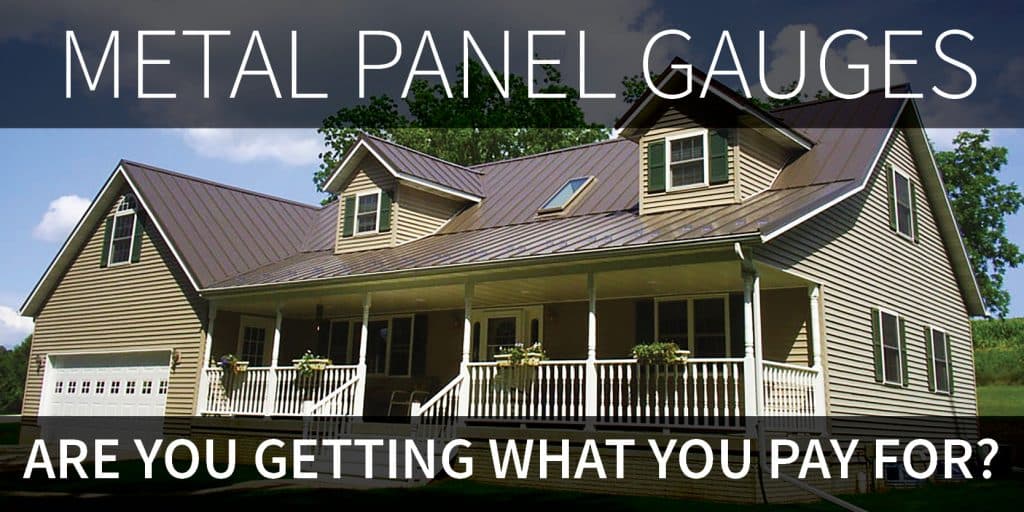When your customers decide to use metal panels for their building project, they’ll need to make several decisions to choose the best panel. One of the first decisions they’ll make is what gauge or thickness they need. There are a variety of metal roof and wall panel profiles to choose from, and they are all available in several gauge thicknesses … but what does that really mean to your customers and how does that affect your business?
Metal Panel Gauges Deciphered
U.S. manufacturers express the thickness of metal panels as their ‘gauge’, with 22-gauge being the thickest and 29-gauge the thinnest of traditionally-sold metal roof and wall panels. Each gauge represents a nominal decimal range. For example, a 26-gauge steel panel can range between 0.0179 and 0.0217 inches thick according to a University of North Carolina at Chapel Hill resource.
This means that while a 26-gauge panel from one manufacturer could measure 0.027 in. thick, a 26-gauge panel from another manufacturer could measure only 0.0179 in., but both are sold as 26-gauge panels. Although those seem like small numbers, they represent a noticeable difference in panel stiffness and strength.
So how do you and your customers know if the metal panel manufacturer has used thinner sheeting and made up the difference with a coat of paint? When ordering inventory, you should look beyond the gauge number to the manufacturer’s specifications on metal thickness. This will give you peace of mind that you’re providing your customers with the gauge they’re paying for and the quality they need to get the job done.
Costs of 26-Gauge Panels vs. 29-Gauge Panels
Expect to pay more for thicker panels. The cost of a 26-gauge product will be about 15 percent higher than a 29-gauge with the same profile from the same manufacturer. While some people insist that the extra cost is always worth it, that may be misleading. Yes, thicker panels are stronger, but the importance of that added strength depends on the type of building construction as well as the customer’s priorities and location.
When To Choose a Thicker Metal Roofing Gauge
There are instances where thicker gauges always earn their keep. The most common of these is the post-frame building, or pole barn: an open-framed structure used for barns, garages and warehouses. Post-frames generally lack structural sheathing, so the roof and wall panels must span between the supporting trusses or purlins. Because 22-, 24- or 26-gauge sheeting is thicker, and will, therefore, remain more structurally sound over a longer span than a 29-gauge, the building needs fewer supports, which saves your customers money. For post-frame structures like this, it is important for your customers to consider the potential snow load the roof may need to support when choosing the metal panel gauge. Lighter-gauge (thicker) panels may save your customers from structural collapse in the winter months!
Lighter gauge (thicker) metal is also more forgiving of installation errors such as the over-tightening of screws, and it won’t be as likely to transfer bumps and waves in the sheathing. (The latter is more likely when re-paneling an older home.) Thicker trim pieces will also lay more accurately, so some homeowners and contractors opt for 29-gauge roof and wall panels with 26-gauge trim, a combination that is common and cost-effective.
When To Choose a Thinner Metal Roofing Gauge
Span isn’t always a concern in the residential market. Nearly all homes have a layer of plywood or oriented strand board sheathing covered by a weather-resistant barrier. The metal panels are affixed to the sheathing and serve no structural role in these instances; their job is to keep the sheathing dry. A quality 29-gauge panel is more than adequate for this—which is why it’s used on nearly 80 percent of homes with metal panels.
Despite this, thicker (lighter-gauge) panels can make sense for buildings in hail-prone areas, but not because of structural integrity. A 29-gauge metal panel can have the same impact-resistance rating from Underwriters’ Laboratory (UL) as a 26-gauge panel; the advantage of thicker metal panels in this case is that they are less prone to denting. If your customer lives in a place like Cheyenne, Wyoming (the hail capital of North America) and is concerned about long-term appearance, thicker panels may be the better option.
Let ABC Help You Choose the Right Metal Panel Gauge!
For more information about metal panel gauges, check out our panel selection chart or contact your local ABC representative today. Additionally, use our online ordering tool to find accurate pricing, create quotes and place orders for metal building products anytime, anywhere and from any device. If you don’t already have an account, register for access today!


